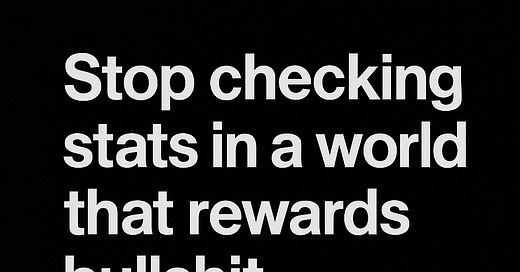There’s a very specific ache that comes with writing from truth in a system that doesn’t immediately reward it. You publish from depth, from clarity, from something lived—and then you watch fluff go viral while your work barely moves. The surface-level wins while the substance waits. And the silence that follows your most honest writing isn’t just frustrating—it’s destabilizing. You start to wonder if truth even registers anymore. If real thought, unglossed and unbranded, still has a place in the collective psyche.
This is where a lot of writers either pivot or quit. Not because they don’t believe in what they’re saying, but because they start believing no one else does. And that shift—from conviction to questioning your own calibration—is brutal. It warps your creative center. You stop following the pulse of what’s real and start listening to the noise. You begin writing toward what “works” instead of what’s true. That’s not just strategy—that’s survival kicking in. And most people don’t realize they’re doing it until their voice becomes unrecognizable even to themselves.
But here’s the reset: your brain is not locked into its current pattern. Neuroplasticity is proof that you are not bound to write from reaction. You can create an entirely new network of thought, behavior, and creative orientation—by choice. You can rewire how you engage with output, visibility, and rejection. You can train your system to stop needing immediate validation and start thriving off internal congruence. That’s not a mindset shift. That’s a neurological redesign. It’s not easy—but it’s available. And it’s what makes the difference between someone who burns out trying to be heard and someone who becomes so internally aligned they can’t be ignored.
The writers who last are not always the most talented. They’re the ones who didn’t confuse silence with insignificance. They’re the ones who kept publishing from clarity even when it felt like no one was listening—because they weren’t writing for applause. They were writing because it was the most honest thing they could do with their existence. They were creating a new language inside themselves—and training their brain to trust it.
You don’t need a million followers to matter. You need congruence between your nervous system and your message. You need a reason deeper than metrics. And you need the discipline to build that reason into something that can hold you when the numbers don’t. This is the real work. Not just writing. But reconfiguring the internal architecture so your voice isn’t dependent on whether it’s echoed back.
Neuroplasticity isn’t just science—it’s sovereignty. It’s what allows you to reclaim authorship, even when the platform seems to be rewarding everything but that. The moment you stop waiting to be chosen and start building your system to withstand the absence of praise—you become unstoppable. Not loud. Not viral. Just clear. And in the long game, clarity wins.
Neuroplasticity is not a mindset. It’s a biological mechanism. It’s the brain’s ability to create new neural pathways through repeated action, attention, and focus. That means your current responses—like discouragement when a post flops, or hesitation when you go to hit publish—are not fixed traits. They’re patterns. Learned responses. Habits of the nervous system that can be interrupted and replaced. This is not about “thinking positive.” It’s about training your system to recognize truth as safety—even in the absence of applause.
Here’s what that looks like in practice:
Awareness first. Name the pattern. Not emotionally—functionally. “Every time I publish something raw, I feel exposed and check the stats obsessively.” That’s a loop. Don’t shame it. Track it.
Interrupt it consciously. Instead of checking analytics after posting, take a breath and redirect your attention—deliberately. Every time you do this, you begin to weaken the old circuit.
Attach the reward to the act, not the result. This is key. Tell your system, “The success was in the publication itself.” Not the likes. Not the comments. The act of alignment is what you’re reinforcing.
Repeat. Consistency is not sexy, but it’s what changes your brain. The more times you act from clarity and refuse to spiral when external feedback doesn’t match internal depth, the more your nervous system learns: I don’t need to panic. I’m safe here.
Over time, your system stabilizes. The highs and lows flatten. You stop grasping for recognition and start creating from neutrality. That’s when your real voice sharpens. That’s when your writing cuts through. Not because you’re trying to be viral—but because your tone isn’t warped by insecurity anymore.
Neuroplasticity gives you your sovereignty back. It makes discipline feel safe again. And for writers—especially those working from deep inner truth—it’s one of the only ways to survive in a system designed to reward performance over reality. You don’t need to change who you are. You just need to make your brain a place where that kind of writing can survive.
Clarity is a function of the nervous system, not just the mind. And you can train for it. On purpose. Right now.
If this cut through the noise—subscribe.
If it made something settle, sharpen, or sting in a way you didn’t know you needed, there’s more where that came from.
This space isn’t about algorithms or aesthetic. It’s about truth. Clean, undistorted, and necessary.
Free subscribers get access to weekly essays, raw clarity, and sharp commentary.
Paid subscribers support the work directly—and get deeper, private pieces, real-time Q&As, and the kind of writing I don’t post anywhere else.
Not because it’s secret. Because it’s sacred.
If you’re building a nervous system that can handle silence, clarity, and sovereignty—
Subscribe. And if you’re ready to go further—
Pay to stay in the deep end with me.





